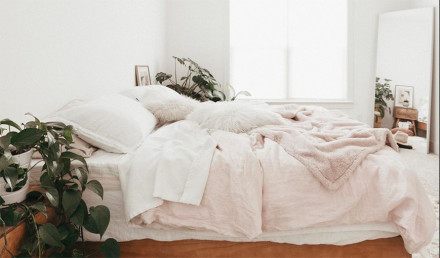Going out is overrated. Sleep is not. This weekend – like most – we’re making sleep a priority. When it comes to getting a good night’s rest, it's important to follow your instincts. Proper sleep not only helps our brains process and store memories, it’s necessary for muscle repair, immunity and overall health. And while it's important to get enough sleep, there is a general misconception about how much is actually needed. At the end of the day, each person's sleep need is unique. Here are a few ways to prepare your mind and body for sleep, from a digital detoxing before the lights shut off to keeping a regular sleep schedule – all encouraging a clearer, more peaceful state of mind.
Form Healthy Habits
Good sleep begins with healthy habits in your day-to-day life. As human beings, we're naturally hungry for mental stimulation, which in-turn, promotes relaxation. The best way to meet these needs is to live fully. Making sure to engage in time outdoors, socializing, regular exercise and other activities you enjoy is a win win for you and your sleep! On the other hand, it's equally important to limit habits that negatively impact sleep hygiene: the intake of caffeine, alcohol, nicotine and frequent naps.
Keep a Routine
Sweet dreams are more than hours logged between the sheets. Having good sleep hygiene promotes overall better sleep and health. This entails forming a healthy routine and behaviors around sleep. We're proponents of using the bed only for the three S's: sleep, sex, sick – meaning no TV, smart phones, reading, eating or arguing in bed. Associating your bed only with sleep, as well as keeping a consistent bedtime routine and keeping a consistent wake time is the foundation of a healthy sleep routine.
Don't Stress
If you do find yourself having a hard time falling asleep, the worst thing you can do is beat yourself up about it. When the routines, digital detoxes, melatonin, mindfulness and exceptionally comfortable bedding aren’t doing the trick, it may be time to take more action. An estimated 30% of the adult population suffer from insomnia and while there is no one-size-fits-all solution, there are steps you can take to tackle the sleep disorder.
Follow Your Instincts
Ultimately our sleep cycles are predetermined by nature. Much like animals or newborn babies, our bodies were designed to sleep. So when it comes to getting some shut eye, stop pushing yourself when you’re really just holding your body back. Get in bed and give yourself the sleep you deserve.
Wondering how noise can help you sleep? Read our articles What is White Noise and What is Pink Noise to learn why these calming sounds are great for sleep.

